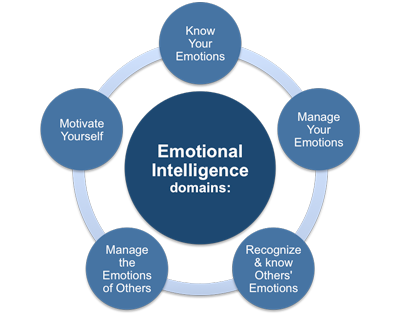The term emotional intelligence (EI) relates to how a person recognises their emotions and of those with whom they communicate. EI is also characterised by how people label and use emotions to guide their thinking and behaviour. The success level of communication is directly related to the EI of the communicators. A person can enhance their EI by taking the time to understand the emotions related to certain moods and behaviours. This can be done by studying emotional ques in people’s facial expressions whilst talking to them and how they react to different topics.

Body language is another factor that can be used to recognising moods and to increase one’s EI. Moods such as anger and anxiousness both cause people to display rapid breathing, pounding heart and irritability, but anger is also accompanied by either folded arms and/or hand on hip; both can also be a cause for pacing.
There is a direct relationship of causality that exists between one’s understanding of the appropriate mood for a given situation and the outcome achieved. If required to perform a task and the decided mood is a negative one, chances are that the outcome of the task will be poor because there will be a lack of motivation and thought that will be applied. The opposite outcome will occur should a positive mood be de
cided. Understanding how to prevent certain negative emotions from impacting a situation can enhance one’s emotional intelligence. In a situation where a person does not fully agree with an activity/idea, this arising negative reaction may be countered by recognising possibilities to re-shape the situation so that it is perceived as beneficial for both themselves and for anyone else that is involved. Being able to recognise secondary paths to understanding reduces the possibility of negative feedback and the risk of disrespecting another individual or group of people.
A final method which may enhance emotional intelligence is building an emotional vocabulary. Author Karla McLaren describes the world’s collective emotional vocabulary as paltry, meaning that most people aren’t descriptive enough about their emotions, which causes the lack of ability to describe how we feel in certain circumstances.
References
Genere, P., Gill, R., Lawson, C. and Lewis, M. (2015) Communication Skills For Business Professionals. Ch 9. Cambridge University: Cambridge University Press. (Accessed: 10 May 2016)
Jeanne, S., Smith, M. and Shubin, J. (2016) Key skills for raising emotional intelligence. Available at: http://www.helpguide.org/articles/emotional-health/emotional-intelligence-eq.htm (Accessed: 13 May 2016).
McLaren, K. (2010) Your emotional vocabulary list. Available at: http://karlamclaren.com/emotional-vocabulary-page/ (Accessed: 13 May 2016).
reserved, F.-M.A. rights (2015) Understanding emotional intelligence. Available at: http://www.free-management-ebooks.com/faqpp/understanding-01.htm (Accessed: 16 May 2016).